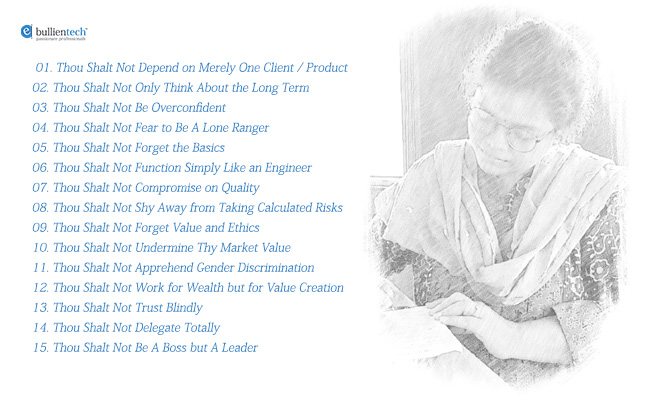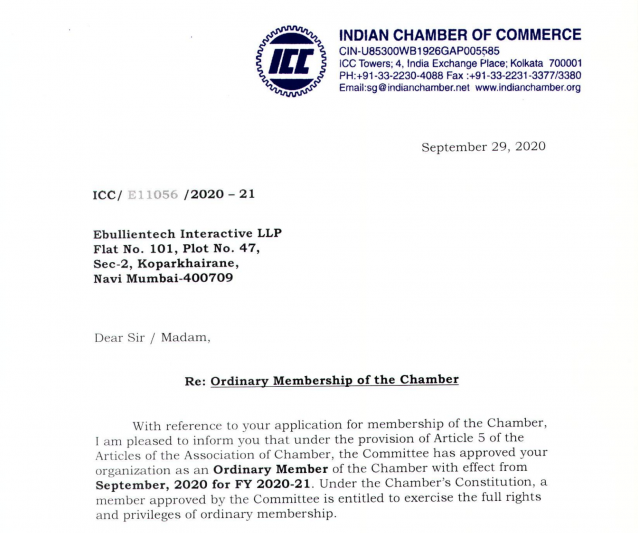January 2018 at we started our journey in Navi Mumbai/Mumbai, December 2020 we have expanded in Kolkata… proud moment!

thinking nothing...............!!
January 2018 at we started our journey in Navi Mumbai/Mumbai, December 2020 we have expanded in Kolkata… proud moment!


Before we begin, let’s first understand who a ‘techpreneur’ is or what , being so, entails. While there is no Oxford dictionary reference available for this term, but Merriam Webster defines “techpreneur” as a noun meaning “an entrepreneur involved with high technology”, and Collins says “A techpreneur is an entrepreneur who starts and manages their own technology business”.
An article in Inc42 defines techpreneurs as – ‘a new class of entrepreneurs who manage to harvest technology and convert every seemingly minor opportunity into a commercial reality’.
As for me, when I decided to launch my technology outsourcing startup Ebullientech, I knew my forte was product engineering, so I chose projects which demand first in class business and engineering amalgamation acumen, but little did I know that I was referring to techpreneurship! It has now been nearly three years and a couple of products…… I have attained a stage where I have learnt what not to do in the path of becoming a techpreneur.
Needless to say, that I have learnt not only from my own mistakes, but from those of other entrepreneurs too, for whom I had worked as a tech enabler/provider.
The original ten commandments were the mandates given by Jesus to Moses on Mount Sinai to shape the pillars of moral behaviour of the human race, in other words, they were the moral code of conduct and foundation of the modern legal system.
Our commandments are a mix of ground realities and guidelines, needed to survive as a technology entrepreneur in the era of a highly demanding product startup ecosystem.
We began our journey back in 2018 with one product company whose founder promised us the world and vouched for combined growth within nine months. Our earlier startup experiences warned us not to depend only on him, and we went on signing up with other product-based startups. Since we didn’t have the support of an investor or family funds, our only way of surviving/sustaining was the recurring incomes coming from product retainers and fixed cost technology projects. About six months back, that founder went back to the life of 9-to-5 employment, yet we’ve managed to remain afloat and, are well on our way, to completing three years of operation.
Clients never favour shared attention, but till the time they are not able or willing to pay at the scale that can keep us captive only to them, we must find ways to sustain and grow. Commercial success is still a faraway dream for us, but we have at least established a reliable foundation for ourselves where we don’t depend on one client or product for survival.
Having foresight and thinking long term is great, but in today’s tech world, we work with agile methodologies which demand successful completion of short-term goals to accomplish the long-term objective with accuracy. Just as our lives are work in progress, every product lifecycle is also a work in progress. In the path of the development of a successful product, we must divide the product modules into epics and epics into stories and stories into sub-tasks. It is extremely difficult (almost impossible!) to fix the mistakes/errors at the end of the product’s lifecycle.
Rather, we should have a roadmap which addresses the problems in stages. Also, for every problem statement, there should be two types of solutions one short-term business goal-oriented and the other, long-term, which covers the tech debts and ensures sustainable quality.
Confidence and self-worth are an engineer’s greatest assets as they enable us to carry the can-do attitude that gives us the courage to venture into unknown technology territories. Sometimes supreme confidence leads us to make irreversible mistakes. Recently we were given the task to build a time-sensitive product module targeting a specific event, and my team confidently committed to a timeline, considering they knew the product codebase well enough. It is mortifying for me to accept the fact that we failed the timeline, incurring financial losses to both the client and us. While my people defended themselves vehemently saying the time fiasco was the effect of faulty code quality from the original developer, in my evaluation, it is a classic case where we were overconfident to not have done an impact analysis and committed erroneously on the timeline.
Entrepreneurship is difficult, and techpreneurship is even more challenging because we have the job of making other businesses successful. Teamwork is crucial for any business to thrive, but a techpreneur must have the willingness and capability work as an individual contributor for every department that needs his/her close attention. S/he should be the backbone and the disaster recovery system as the organisation and the enterprises dependent on him/her. S/he should be the best architect, coder, tester of the team. S/he must have every solution up her sleeves; in summary, s/he should be the best service/product offering of her enterprise. S/he needs to stay updated on market dynamics and new trends in technology and Ready to fight perceived and unforeseen threats. S/he should be the friend, philosopher, and guide for both his/her people and her customers but in her own space, she has to toil alone like a fearless lone ranger.
In every sport knowing the basics is crucial, like in tennis, if you are not good at serving, then you can never hit an ace, in pace bowling, if you don’t know how to deliver a good length ball then accomplishing a yorker would be impossible. The foundation of techpreneurship lies in engineering; your concepts of logical reasoning, mathematics (more of arithmetic), algorithms, and English language must be sharp. You must not forget the basics of corporate communication like responding to emails, WhatsApp messages punctually so that clients don’t feel ignored, you must communicate with your customers proactively and should always be there for them at the earliest possible time.
Every techpreneur is a software engineer at heart, but that’s not enough when you are driving your enterprise and helping others to manage theirs. You must take active interests in business goals, sales numbers, social media engagements, books of accounting, analytics, recruitment, human resource activities, office administration, compliance. When a client comes to you with their business problem, you must think and act like a businessperson first, then translate the problem to an engineering puzzle and then build the solution.
Technology outsourcing companies often gain a bad reputation because of delayed delivery and compromised quality which happens as their leaders get too busy improving sales numbers and growth hacking. A techpreneur’s reputation must precede him/her in the right way where people should remember him/her for quality and time sensitivity. At times it would be fine to miss deadlines in order to maintain quality, but that must not become the excuse for constant delays. The foundation of quality lies in planning and thinking long-term. Software engineers often jump into execution and forget planning which results in quality issues and timeline failures.
“Entrepreneurs are not risk-takers. They are calculated risk takers” as pointed out by Leonard C. Green, in Entrepreneur. The word “Calculated” makes all the differences; taking a risk is like having one turn in a game of roulette; if we fail, we don’t live to take another chance. Taking a calculated risk is asking yourself how cost-efficiently I can handle it, how minimal are my probabilities of failure, and also what kind of credibility I shall be able to generate if I succeed. Calculated risk taking happens in an agile manner, one step at a time and with each new phase, we try to figure out how to reduce the risk further.
The realm of technology is glamourous and grey, most of the software engineers think that storing client’s code and data in their local infrastructure is ethical. They also fail to see the importance of timeline and quality commitments. As a techpreneur, one must drive their people to meet the highest standards of value and ethics as formulated in the Software Engineering Code of Ethics and Professional Conduct (Source: https://ethics.acm.org/code-of-ethics/software-engineering-code/).
PUBLIC – Software engineers shall act consistently with the public interest.
CLIENT AND EMPLOYER – Software engineers shall act in a manner that is in the best interests of their client and employer as well as, consistent with the public interest.
PRODUCT – Software engineers shall ensure that their products and related modifications meet the highest professional standards possible.
JUDGMENT – Software engineers shall maintain integrity and independence in their professional judgment.
MANAGEMENT – Software engineering managers and leaders shall subscribe to and promote an ethical approach to the management of software development and maintenance.
PROFESSION – Software engineers shall advance the integrity and reputation of the profession consistent with the public interest.
COLLEAGUES – Software engineers shall be fair to and supportive of their colleagues.
SELF – Software engineers shall participate in lifelong learning regarding the practice of their profession and shall promote an ethical approach to the practice of the profession.
Just as you should take your business valuation seriously and always keep working on it, you must not undermine your market value as an entrepreneur. It was you who saw the potential in quitting a high paying job in order to take up the responsibility of running an enterprise. Most of the technology entrepreneurs don’t have any prior entrepreneurial experience; hence their chances of failure are much higher than one coming from a management or business administration background. Unlike other entrepreneurs, techpreneurs must be a know-it-all because they are primarily engineers trying to become successful businesspersons. Your journey will set examples for future aspirants; your intelligence and hard work will attract new talents and engage more customers. Your market saleability and acceptability will always play a crucial role in your business’s valuation.
Gender discrimination exists, and it is going to prevail. We cannot avoid it, but we can indeed handle it well so that it acts neither as a roadblock nor as an excuse in the path of success. Gender bias is an issue that exists in all spheres of society; entrepreneurship is no exception, and the only way to overcome it is to be supremely confident about yourself. A technology entrepreneur gets his/her confidence from two things knowledge and his/her ability to communicate persuasively. If you are a female techpreneur, then your gender should not affect your self-worth; likewise, being male should not make you feel overconfident. It is the power of knowledge and intellect that keeps you ahead of the competition.
As entrepreneurs, we unquestionably want to create wealth, but if that is the only thing we care about, then that is a problem. Most startups fail because of lack of funds, but they often forget to analyse how they were spending. The last startup I was working for, as an employee failed because of too much pilferage in sales and logistics that resulted in value deficiency which could have been avoided by focusing on EBITDA (Earnings Before Interest, Taxes, Depreciation, and Amortization profitability).
Exercising a controlled approach over expenses could have helped them achieve EBITDA and in turn, better valuation followed by sizeable funding. Too much aggressiveness towards customer acquisition leads to a burn, which in turn, leads to further value deficit. Achieving EBITDA is a good thing, but as an enterprise, we must make sure not to pay government penalties, late fees and interest on fines. In India organisations often end up paying heavy government and bank penalties but fail to pay their employees, consultants, vendors duly.
We techpreneurs primarily rely on our workforce in order to succeed. We cannot function without trusting our people, but it is unwise to count on them blindly. We should be watching over the quality of their work, their commitments, and their willingness to fulfil the same. We must keep a close watch, on the communications between the team and clients so that no solicitation can take place.
An entrepreneur has to don many hats, and without effective delegation, it is not possible to accomplish success. Absolute delegation may lead to process gaps and inefficient results. Processes like sales, finance, human resources need entrepreneurial supervision. Sales generates revenue, finance manages income and without the right people, it impossible to deliver efficiently. You may delegate the tasks totally, but the delivery of the same needs to bemicro-managed. You may delegate finance operations completely but , at the same time, you do need to monitor transactions closely so that there is no embezzlement or mismanagement of funds.
The key difference between leaders and bosses is that leaders can influence without authority, and bosses can’t function without power. Your focus should always be on sustainable solutions, not patchworks. You must act with empathy and sensitivity but not emotionally, which means you need to care about people’s reactions to your activities and behaviour, but you must not react emotionally towards their actions. A leader’s goal is to create a legacy and make their people successful. Leaders always take ownership of their actions, and he/she should drill down the same to their people. Being bossy can help you achieve short-term success, but entrepreneurship is a long-term life goal which demands the selflessness, strength and conviction of a leader.
I have written the commandments based on my experience with various startups for the past six years out of which last three years are of building and leading Ebullientech, my own technology outsourcing company. I’m sure other techpreneurs will have different opinions and advice, especially the ones trained in ESM (Entrepreneurial Science and Management), and I would love to learn from them to shape the future for all of us. There is one thing which I forgot to mention under the headings – it is the contribution of my team to produce an entrepreneur out of an ordinary person like me. One day I would like to dedicate a whole essay to our journey. Its been nearly three years, and we have lived so many emotions together that it feels like a voyage of a lifetime.
I would like to conclude with what Bill (William) Campbell said…
“If you’re a great manager, your people will make you a leader. They acclaim that, not you.” He once wrote to a struggling manager: “You have demanded respect, rather than having it accrue to you. You need to project humility, a selflessness, that projects that you care about the company and about people.”
Article edited by: Anuradha Abida Lahiri
 According to the Oxford dictionary, the word “sweet” depicts a kind of taste with the properties of sugar or something that is not savoury, bitter, or sour. To Bengalis “Mishti” means a dessert for which the main ingredient would be either or a combination of the following elements milk, chhana/paneer/cottage cheese, besan/chickpea flour, rice flour, puffed rice (Muri), flattened rice (Chire/Poha), popped rice (Khoi), coconut shavings and the sweetener will be either white sugar of or date palm jaggery (seasonal). Among all the ingredients, chhana is the most widely used, chhana is nothing but the Indian version of cottage cheese which is referred to as “paneer” by the rest of India and as Chhana, Chhena, Sana (Asam) by north-eastern India. Sometimes chhana is mixed with one or two of the other elements to create variations.
According to the Oxford dictionary, the word “sweet” depicts a kind of taste with the properties of sugar or something that is not savoury, bitter, or sour. To Bengalis “Mishti” means a dessert for which the main ingredient would be either or a combination of the following elements milk, chhana/paneer/cottage cheese, besan/chickpea flour, rice flour, puffed rice (Muri), flattened rice (Chire/Poha), popped rice (Khoi), coconut shavings and the sweetener will be either white sugar of or date palm jaggery (seasonal). Among all the ingredients, chhana is the most widely used, chhana is nothing but the Indian version of cottage cheese which is referred to as “paneer” by the rest of India and as Chhana, Chhena, Sana (Asam) by north-eastern India. Sometimes chhana is mixed with one or two of the other elements to create variations.
“Misthi” for Bengalis is not just a food item it represents their culture and tradition, whether it’s a get-together, puja at home or a celebration like a wedding, a temple feast “Mishti” is not only inevitable but the star of the show.

 Here are some names of Bengali sweets that don’t use chhana as their principal component like Mishti Doi, Rabri, Payesh (Kheer for rest of India), Jilipi & Amritti (called as Jalebi otherwise), Dorbesh, Patishapta, Malpoa (Malpua), Narkel Naru (laddoos made of coconut shavings), Puli Pithe, Sitabhog, Mihidana. Some sweets are moist (“ros-er mishti”) and some are dry (like “Sondesh”), and some are a combination of both (like “Jolbhora”).
Here are some names of Bengali sweets that don’t use chhana as their principal component like Mishti Doi, Rabri, Payesh (Kheer for rest of India), Jilipi & Amritti (called as Jalebi otherwise), Dorbesh, Patishapta, Malpoa (Malpua), Narkel Naru (laddoos made of coconut shavings), Puli Pithe, Sitabhog, Mihidana. Some sweets are moist (“ros-er mishti”) and some are dry (like “Sondesh”), and some are a combination of both (like “Jolbhora”).
It is impossible to cover all types of Bengali sweets within the boundaries of one piece of a write-up, but I would like to talk a tad deeper about the ones that are my favourite!

 Despite the rows between Bengali and Odia communities on who made Rasogolla first, the World recognise it as one of the most extraordinary desserts from the Indian subcontinent. Primary ingredients to make Rasogolla are chhana and white sugar. Chhana made from full fat cow milk, and the sugar should be white refined fine-grained. Of course, Rasogolla by no means is health food no matter how dearly Bengalis promote it as one! Chhana once prepared and cooled to room temperature is mixed with sugar, semolina, all-purpose flour (secondary elements vary depending on the recipe) to create the perfectly round-shaped balls, and then more sugar and water are used to make the syrup (Ros/Chaasnee). There are other Rasogolla spin-offs like Rasmalai, Chom Chom, Rajbhog, Chhanar Payesh (even Pantua, Ledikeni, Langcha are Rasogolla improvisations). During winters there is a premium variety made with date palm jaggery instead of sugar.
Despite the rows between Bengali and Odia communities on who made Rasogolla first, the World recognise it as one of the most extraordinary desserts from the Indian subcontinent. Primary ingredients to make Rasogolla are chhana and white sugar. Chhana made from full fat cow milk, and the sugar should be white refined fine-grained. Of course, Rasogolla by no means is health food no matter how dearly Bengalis promote it as one! Chhana once prepared and cooled to room temperature is mixed with sugar, semolina, all-purpose flour (secondary elements vary depending on the recipe) to create the perfectly round-shaped balls, and then more sugar and water are used to make the syrup (Ros/Chaasnee). There are other Rasogolla spin-offs like Rasmalai, Chom Chom, Rajbhog, Chhanar Payesh (even Pantua, Ledikeni, Langcha are Rasogolla improvisations). During winters there is a premium variety made with date palm jaggery instead of sugar.
In Kolkata Dhiman Das maintains that his ancestor Nabin Chandra Das who established a sweet shop in Jorasanko of North Kolkata back in 1864 had invented Rasogolla. In Odisha, they believe in a myth that says that Rasogolla was offered to an upset Goddess Lakshmi as bhog by her husband Lord Jagannath and they celebrate the ritual as “Niladri Bije”, Lord Jagganath’s return to Shree Mandir, the last day of Ratha Yathra in Puri. They marked the return of Lord Jagannath as Rasogolla Dibasa, to authenticate the foundation of Rasogolla ((the first celebration was on July 30 2015). Regardless, it is fair to say that no matter wherever the origin is Rasogolla prevails to be one of the most popular desserts of India.
 Another Bengali dessert made with chhana and sugar/date palm jaggery depending on the season. Sondesh plausibly exists in the maximum number of variations across Bengal. There are distinct categorisations labelled as Koda Paak (hard knead) and Narom Paak (soft no-knead). Bengali sweet aficionados fancy Gur Sondesh (the one made with date palm jaggery) over other kinds. Kolkata Bengalis love their Koda Paak, especially the one described as Jolbhora it is a heart-shaped Misthi and at the centre, it has jaggery syrup filling, the 2018 film Dhadak, suggests several references to this one. Another well-known form of Sondesh is called Kanchagolla. Then there is Sorpuria, but Bengalis may debate deciding whether it is a type of Sondesh or a completely different “Mishti”. There is also Makha Sondesh usually available in smaller towns and villages. This type of Sondesh is a slightly grainy, soft no-knead almost Kheer like dessert.
Another Bengali dessert made with chhana and sugar/date palm jaggery depending on the season. Sondesh plausibly exists in the maximum number of variations across Bengal. There are distinct categorisations labelled as Koda Paak (hard knead) and Narom Paak (soft no-knead). Bengali sweet aficionados fancy Gur Sondesh (the one made with date palm jaggery) over other kinds. Kolkata Bengalis love their Koda Paak, especially the one described as Jolbhora it is a heart-shaped Misthi and at the centre, it has jaggery syrup filling, the 2018 film Dhadak, suggests several references to this one. Another well-known form of Sondesh is called Kanchagolla. Then there is Sorpuria, but Bengalis may debate deciding whether it is a type of Sondesh or a completely different “Mishti”. There is also Makha Sondesh usually available in smaller towns and villages. This type of Sondesh is a slightly grainy, soft no-knead almost Kheer like dessert.
 Ah, the little too sweet variety of curd only ever available in Bengali dessert shops and nowhere else! Yes, though nowadays there are some brands like Mother Dairy, Epigamia offering “Misti Doi” but then the unadulterated taste can be only be felt (yes, you read it right, you have to feel the taste!) when served in an earthen bowl called Matir Bhanr (Kullad). Main elements consist of milk, curd culture, and sugar or jaggery. Of course, the milk has to be full fat and sugar has to be white refined fine-grained and if jaggery then the date palm. The fermentation process is much longer than that of regular curd, and it also varies depending on the weather conditions.
Ah, the little too sweet variety of curd only ever available in Bengali dessert shops and nowhere else! Yes, though nowadays there are some brands like Mother Dairy, Epigamia offering “Misti Doi” but then the unadulterated taste can be only be felt (yes, you read it right, you have to feel the taste!) when served in an earthen bowl called Matir Bhanr (Kullad). Main elements consist of milk, curd culture, and sugar or jaggery. Of course, the milk has to be full fat and sugar has to be white refined fine-grained and if jaggery then the date palm. The fermentation process is much longer than that of regular curd, and it also varies depending on the weather conditions.
 “Bhaja” is a Bengali word which means fried, ingredients of Bhaja Misthi are chhana, sugar, semolina, all-purpose flour. They are a moist variety of Bengali dessert, soaked in thick sugar syrup (Ros) after deep frying. Other variations of Bhaja Mishtis consist of Pantua, Langcha, Ledikeni, Kalojam, Chitrokut, Sorbhaja. Rest of India has only one variety of Bhaja Mishti called Gulab Jamun!
“Bhaja” is a Bengali word which means fried, ingredients of Bhaja Misthi are chhana, sugar, semolina, all-purpose flour. They are a moist variety of Bengali dessert, soaked in thick sugar syrup (Ros) after deep frying. Other variations of Bhaja Mishtis consist of Pantua, Langcha, Ledikeni, Kalojam, Chitrokut, Sorbhaja. Rest of India has only one variety of Bhaja Mishti called Gulab Jamun!
A variety of Bengali desserts that appears like a Sondesh, and is kept moist inside, it like Rasogolla wrapped in a Sondesh skin. Little too sweet and has Sev like garnishing. The popularity of this one is debatable as many Bengali dessert connoisseurs don’t fancy “Khir Kadom” and consider it as overrated.
 The Bengali variant of Boondi Laddu made using gram flour, sugar, ghee/vegetable oil, and tastemakers like cardamom, cashew along with edible colours. Sumptuous when consumed fresh and mildly hot but little greasy and hard if kept in the fridge (not the ones made with ghee!).
The Bengali variant of Boondi Laddu made using gram flour, sugar, ghee/vegetable oil, and tastemakers like cardamom, cashew along with edible colours. Sumptuous when consumed fresh and mildly hot but little greasy and hard if kept in the fridge (not the ones made with ghee!).
 Mihidana and Sitabhog both originated from a place called Burdwan, West Bengal. Primary elements of Mihidana are rice flour and sugar syrup, a distant cousin of Boondi where Mihi means fine, and Dana means grains. Sitabhog is also made using rice flour, sugar syrup, and has vermicelli like shapes. Authentic
Mihidana and Sitabhog both originated from a place called Burdwan, West Bengal. Primary elements of Mihidana are rice flour and sugar syrup, a distant cousin of Boondi where Mihi means fine, and Dana means grains. Sitabhog is also made using rice flour, sugar syrup, and has vermicelli like shapes. Authentic
 Mihidana and Sitabhog both may contain miniature Gulab Jamun like balls called “Nikuti”, for Sitabhog they are mandatory and optional for Mihidana.
Mihidana and Sitabhog both may contain miniature Gulab Jamun like balls called “Nikuti”, for Sitabhog they are mandatory and optional for Mihidana.
These days Kolkata city is filled with premium/branded dessert shops who offer boutique-style Bengali desserts or “Mishtis” and the townships around Kolkata like Chandannagar, Kalyani, Krishnanagar continue to produce the traditional varieties of Bengali desserts. While city-based premium stores focus on variety and improvisation semi-urban, village shops are about authenticity and genuineness.
Bengali desserts have travelled beyond Kolkata and West Bengal, nowadays every prominent city in India has many Bengali dessert shops, and they are savoured by millions of Indians whether Bengali or not.
It gives me immense pleasure to announce that our company Ebullientech Interactive LLP is now a member of ICC (Indian Chamber of Commerce), it would have never been possible without the referral of my dearest friend Shakuntala Sen.

It is a personal note which I thought of sharing, in memory of my deceased father, I hope it makes some sense for all of us.

The Monologue
My father and I were never close, at least that’s what I thought. Now, what does closeness/friendliness to your parent mean? Probably it means that you can share/discuss anything and respect one’s value addition to the other’s life decisions. I remember always fighting/debating with him over matters like which field of study should I chose, what political party should vote for, which politicians are worth our trust, how should I behave with a particular person even if I dislike him/her, when should I express my opinion and when not. While he was never a typical chauvinist, but his attitude towards my mother often seemed like one, but his female friends/colleague were gung-ho about the helpful and open-minded person he was. One of our most significant issues was his indulgence towards my younger sibling, I was always of the opinion that he should be stricter towards her for her good, but he would be biased and overlook every mistake she did. He was a simple, peaceful person who would generally not prefer to be part of any disagreement, but he was a person of opinion, especially about things that concerned him, or people close him. Was he a loving and doting father? No, his expressions would never say so, he was an idealist busy in his world of thoughts. He was someone who would smile only when his friends/colleagues were around. He was not an ideal father we read in books or see in movies. Did all of these make him a bad father? Now, what is the definition of a good parent? I believe there is no definition or pattern. I wouldn’t have the capability or courage of doing what I did with my life or the decisions I took if he was. He was a person who never made us feel that every Indian family needs a son. His daughters were more than enough. He wanted his children to be girls because he believed women have better compassion than men and that they were emotionally more powerful. He taught me to read books and watch movies without inhibitions and encouraged that I have my opinion about everything I see or learn, but I need not be getting into an argument to prove my point, I must choose my battles carefully. He never tried to become my teacher; he would talk about things randomly like a friend and encourage me to pay attention and remember/learn them for life. He was the most honest person I have ever seen in life; he would never ask for favours, won’t take gifts from clients and help them in every possible problem they had, and most of the times going beyond his way. He was a food enthusiast who hated spending money in restaurants but wanted my mother to cook all things possible at home, and he would read and talk about food/recipes from across the globe. He became so sickly before his demise that everyone thought it would be only fair to him to rest in peace, but I fiercely wanted him to stay, and he knew that. I never thought I would be, so grief-stricken after he was gone because we never had an apparent loving relation. Most of the time, I would be angry with him for not being fair to me or not listening to me for innumerable reasons. I wanted the grief to go away, but my every such attempt would push me to a fresh episode of depression. After almost a year of internal fighting, reasoning I realised, it is not possible to get rid of the grief of losing a parent because whether I want to admit it or not, I loved him, and he loved me too but in his unconventional ways. In many ways, I became the person he taught me to be, I inherited his emotions, his integrity, his intellectuality. We don’t get to choose our parents but whether we like it or not we become the product of our parent’s behaviour/nature and education. Like every child is not the same, and they need the upbringing suiting their specific needs, in the same extent, every parent isn’t the same. Like our parents give the effort to make us better, worthier similarly we also must invest in understanding our parents. I wish there shouldn’t anyone out there who understood the feelings for her father after he was gone. In my defence, while most of my life, I kept fighting/debating/arguing with my father over various matters I did protect him like my son. I lost my emotional intelligence after he was gone and still struggling to get my composure back, but one of my life’s most important lesson that it is crucial to emotionally invest in knowing your parents better otherwise we may have to lament for a lifetime. It took me almost two years (after his death) to pen down a memoir like this but, belatedly I did it defeating my ego to accept the biggest fallacy of my life. I thought it was essential to share because many from our generation would have similar differences with their parents without even being cognisant about the same.